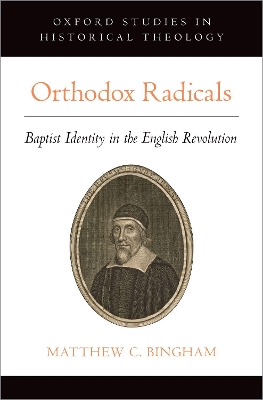Oxford Studies in Historical Theology
1 total work
In the seventeenth century, English Baptists existed on the fringe of the nation's collective religious life. Today, Baptists have developed into one of the world's largest Protestant denominations. Despite this impressive transformation, those first English Baptists remain chronically misunderstood. In Orthodox Radicals, Matthew C. Bingham clarifies and analyzes the origins and identity of Baptists during the English Revolution, arguing that mid-seventeenth
century Baptists did not, in fact, understand themselves to be a part of a larger, all-encompassing Baptist movement. Contrary to both the explicit statements of many historians and the tacit suggestion embedded in the very use of "Baptist" as an overarching historical category, the early modern men and
women who rejected infant baptism would not have initially understood that single theological stance as being in itself constitutive of a new collective identity. Rather, the rejection of infant baptism was but one of a number of doctrinal revisions then taking place among English puritans eager to further their on-going project of godly reformation.
Orthodox Radicals complicates our understanding of Baptist identity, setting the early English Baptists in the cultural, political, and theological context of the wider puritan milieu out of which they arose. The book also speaks to broader themes, including early modern debates on religious toleration, the mechanisms by which early modern actors established and defended their tenuous religious identities, and the perennial problem of anachronism in historical writing. Bingham also
challenges the often too-hasty manner in which scholars have drawn lines of theological demarcation between early modern religious bodies, and reconsiders one of this period's most dynamic and influential religious minorities from a fresh and perhaps controversial perspective.
By combining a provocative reinterpretation of Baptist identity with close readings of key theological and political texts, Orthodox Radicals offers the most original and stimulating analysis of mid-seventeenth-century Baptists in decades.
century Baptists did not, in fact, understand themselves to be a part of a larger, all-encompassing Baptist movement. Contrary to both the explicit statements of many historians and the tacit suggestion embedded in the very use of "Baptist" as an overarching historical category, the early modern men and
women who rejected infant baptism would not have initially understood that single theological stance as being in itself constitutive of a new collective identity. Rather, the rejection of infant baptism was but one of a number of doctrinal revisions then taking place among English puritans eager to further their on-going project of godly reformation.
Orthodox Radicals complicates our understanding of Baptist identity, setting the early English Baptists in the cultural, political, and theological context of the wider puritan milieu out of which they arose. The book also speaks to broader themes, including early modern debates on religious toleration, the mechanisms by which early modern actors established and defended their tenuous religious identities, and the perennial problem of anachronism in historical writing. Bingham also
challenges the often too-hasty manner in which scholars have drawn lines of theological demarcation between early modern religious bodies, and reconsiders one of this period's most dynamic and influential religious minorities from a fresh and perhaps controversial perspective.
By combining a provocative reinterpretation of Baptist identity with close readings of key theological and political texts, Orthodox Radicals offers the most original and stimulating analysis of mid-seventeenth-century Baptists in decades.
